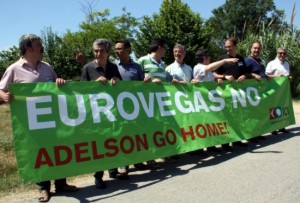
It sounds like the answer to the prayers of the Spanish government. A multi-billion-dollar gambling complex led by an American tycoon who promises to bring the glamour of California to Spain and kick-start the country’s struggling economy by creating a quarter of a million jobs.
But EuroVegas, as it’s known, is also a scheme that has sparked fears about spiralling crime, prostitution and environmental violations and which has highlighted the age-old tensions between Spain’s two main cities.
American casino magnate Sheldon Adelson, with an estimated $25-billion fortune, plans to build a European gambling hub that will include six casinos and 12 hotels. His Las Vegas Sands company says it chose Spain for its climate, tourism and job creation potential.
“There is no one place in Europe that is fun to go to and play the slots or play tables or have a good time with an adult couple or family,” Adelson told investors in New York last year.
But the firm is still undecided over whether to base EuroVegas in the Catalan city of Barcelona or the capital Madrid and a decision – initially scheduled for early summer – has been put back until September. Last month, both cities rolled out the red carpet for a Las Vegas Sands delegation as they vied to be chosen.
In Madrid, senior executives from major Spanish firms such as Iberia and Santander met the representatives, who also visited the Prado art museum. The previous day the American delegation was in Barcelona, where Catalan chef Ferran Adrià cooked for the visitors and threw his support behind the city’s bid.
“I offered to help them with whatever they need as long as they bring the project to Barcelona,” Adrià told La Vanguardia newspaper.
But Adrià’s backing has further stoked the already intense rivalry between the two cities.
“Saying ‘I’ll commit to this if you come to Barcelona’ seems to me a provincial thing to say,” said José Quintana, a local politician in Madrid. “I thought [Adrià] was one of our international chefs, but I can see that he’s got a very provincial mentality.”
Relations between Madrid and Barcelona are often fraught due to disagreements over regional financing, the use of the Catalan language in schools, or the two cities’ football teams. But with EuroVegas, up to an estimated 260,000 jobs are at stake in a country where unemployment is at nearly 25 percent. Las Vegas Sands estimates that $19 billion (€15 billion) in investment will be pumped into the project over a decade, with around half that amount needed for the initial phase.
While the local governments in Madrid and Barcelona each hope to land the mega-complex, critics are warning it will be a magnet for crime and prostitution, will blight the landscape with brash architecture and could create a repeat of the kind of construction-based bubble that sent the Spanish economy plummeting into its current crisis.
In order to build the complex as planned, land-zoning regulations would need to be waived and Madrid regional premier Esperanza Aguirre has even said a 2011 national ban on smoking in public venues will not apply to EuroVegas if it comes to the capital.
These potential law changes anger activists in both Madrid and Barcelona who are campaigning against the mega-casino. To coincide with the recent visit of the Las Vegas Sands delegation, activists gathered in a central square in Madrid and banged pots and pans to express their opposition to EuroVegas.
“This isn’t the time for Spain to pursue a casino-style economic model,” one anti-EuroVegas campaign spokesman told Iberosphere. “We need to create permanent, secure jobs for our workers. We can’t just let Mr Adelson come to Spain and change our laws.”
Former Socialist Prime Minister Felipe González used blunter language to assess Adelson’s plans. “This gentleman can’t change the law in order to turn Madrid, or whoever wins the bid, into a whorehouse,” he said.
But legal issues may not be the project’s biggest problem.
Spain’s recession-burdened economy is at the heart of the euro-zone debt crisis and with its banks receiving an international bailout, there is always a chance that EuroVegas may not come to Spain at all.
“If the project is not able to be financed by the banks, in other words if the world gets worse in the next six or seven months, then of course we would not be able to do the project,” said Michael Leven, CEO of Las Vegas Sands, at the end of his Spanish visit. The company envisages banks putting up two-thirds of the investment needed.
Spain is currently implementing a severe austerity program as it seeks to meet EU deficit targets and negotiates the conditions of the financial sector bailout. This mood of austerity could hardly be further from the roulette wheels, big stakes and pizzazz of Las Vegas.
Novelist José Sanclemente cast an ironic eye on the project in his blog, writing: “If EuroVegas manages to get the government […] to increase public spending, increase employment, build infrastructure, cut taxes, if the banks get used to giving out credit, and on top of that, we’re allowed to smoke a cigar in hotels and casinos – what’s the harm in EuroVegas being built here? But I don’t know if Merkel will let us.”
Leave a Reply
You must be logged in to post a comment.